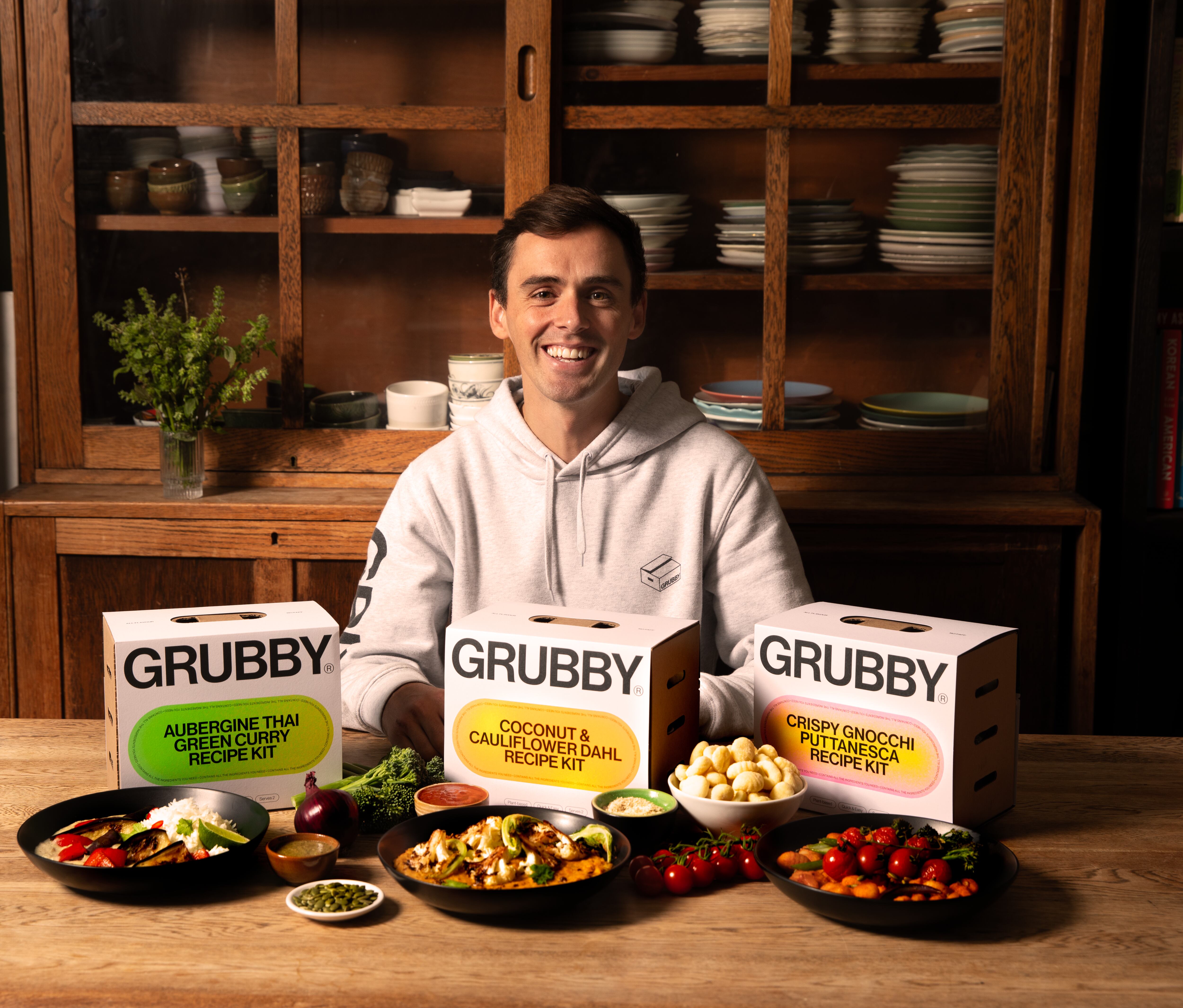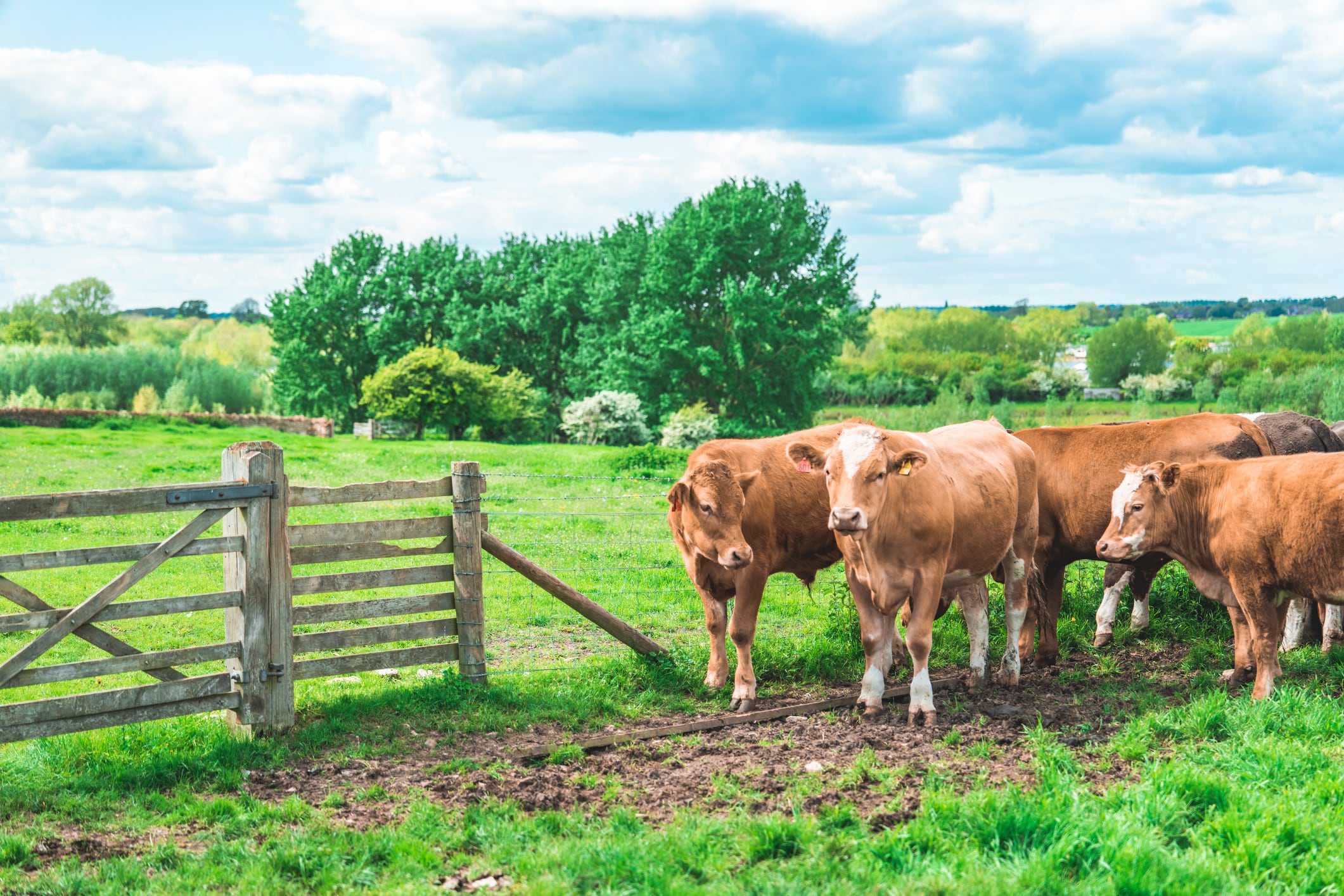On 22 January, GRUBBY marked the launch of its new cookbook with a lunch at a Hackney studio and test kitchen it often works from. The cookbook, which sold 1,000 copies in its first week, is a collection of the very best recipes developed by GRUBBY over the past five years and the basis of its popular meal kit subscription service.
During the event, Holden-White talked guests through each course while offering some fascinating insights into how the dishes came to be. After the food had been served and enjoyed, he sat down with Food Manufacture to provide an honest recap of the journey that GRUBBY has been on since launching in 2019.
Early days
Prior to founding GRUBBY, Holden-White worked in the contract catering sector as a sales representative. This experience sparked the idea to create a prepared meal business that aimed to serve busy office workers who didn’t have time to cook due to long hours and commuting pressures, but wanted something nutritious and tasty to eat when they got home.
“When GRUBBY started out, we were predominantly selling meals in offices and had set up refrigerated units that people could collect from,” he told Food Manufacture.
“This idea was novel, but the Covid pandemic started in early 2020 and soon everyone was working from home so we had to pivot.”
With offices throughout the UK closed, GRUBBY quickly switched to a delivery model. To drum up business, Holden-White and a friend started leafletting the local area and managed to pick up some customers. They then prepared the food at home and began delivering boxes that contained the ingredients and instructions for plant-based meals that could be whipped up in 15 minutes.
“We experimented with one-off deliveries, but quickly saw that developing a subscription model was better for creating some certainty on our part in both the short and long term,” he recalled.
“The NHS was one of our early clients, but director-to-consumer became our primary way to reach people.”
When you look at some companies that have raised tonnes of money early on, they are often forced to throw money at marketing when the product is not yet where it needs to be
Martin Holden-White
While GRUBBY has evolved over time, what hasn’t changed is the brand’s commitment to plant-based food. When founding the business Holden-White had been cutting out meat from his own diet, which caused him to notice something that many vegans and vegetarians will often experience when they first make the switch.
“I realised that a lot of people were struggling to make plant-based food that tastes really good,” he explained.
“So our mission from the start was to make this easier, because there wasn’t anyone else in the recipe kit space trying to achieve this.”
Long-term approach
Ever since adopting a subscription approach in 2020 GRUBBY has taken a cautious approach to growth, instead prioritising building a customer base that it can rely on over time. Holden-White admits that this has sometimes come at the expense of boosting order numbers in the short-term, but it has enabled the firm to build a stable platform.
“When you look at some companies that have raised tonnes of money early on, they are often forced to throw money at marketing when the product is not yet where it needs to be,” he argued.
“If I think back to our earliest recipes, the quality isn’t comparable to what we now offer and that is because of the iterative approach we have taken to development. We listen to feedback from customers and use this to inform how we move forward.”
This isn’t to say that GRUBBY hasn’t taken on investment – it has raised about £6m to date including a grant from the government-backed Innovate UK. However, Holden-White is open in saying that early funding rounds were challenging and this has informed his focus on running a lean operation that is targeting profitability as soon as possible.
“We have had to make some tricky decisions and it hasn’t always been fun but are now in a very stable position and have had our first two profitable months,” he explained.
“Sustainable profitability is now within sight and that is critical for growing the business in the long run.”
By comparison, plant-based ready meal manufacturer Allplants went into administration last November despite having raised almost £70m from investors. Holden-White has a lot of respect for what the firm set out to achieve, but feels that the story is indicative of what the pressure to grow quickly can place on a business.
“It’s really sad for the plant-based category and the people involved. But they had invested in a huge facility that they didn’t have the orders to fill and they were unable to put the brakes on before it was too late. I think a level of blame needs to go on the investors who were not committed to building a sustainable model and instead prioritised this fast-fail approach.”
Plant-based positivity
The narrative around the plant-based category has changed in the past year or so due to the high profile demise of firms such as Allplants or Meatless Farm (which was subsequently rescued by the Vegan Food Group). However, this is not necessarily indicative of the clear demand that still remains for vegan food and drink products, as well as brands such as GRUBBY.
“There has been a lot of attention on meat alternatives but that is not all there is to the category,” Holden-White said.
“That sub-sector has seen a consolidation, which is natural, but the best quality products have survived and you can see that in any supermarket. Beyond that, the amount of people eating plant-based is still increasing year-on-year, and this looks set to continue among younger generations.”
Mintel data supports this assertion, with 39% of parents with children aged four to 16 reporting that sustainability concerns have caused their kids to consume less animal products. Meanwhile, approximately 34% of Gen Z and 28% of millennials in the UK now identify as flexitarian, vegetarian or vegan, compared to just 14% of Gen X and boomers.
“In five years, we aim for Grubby to become a household name, setting the standard for plant-based convenience and sustainability,” Holden-White added.
“We are currently fulfilling around 12,000 orders per month and recently passed the two million deliveries mark, which is a big milestone. From my point of view the signs are really positive for plant-based and we are part of that.”
People need to start building more plants into their diets, but there is a lot of lobbying from meat and dairy firms that is delaying action
Martin Holden-White
To mark Veganuary 2025, GRUBBY partnered with the vegan chef and author duo BOSH! on a special series of recipes. With options including ‘Gochujang Tofu Mac & Cheese’ and ‘Zingy Green Enchiladas with Avocado’, Holden-White has been really pleased with the partnership.
“We’ve been working with BOSH! for 18 months now and it was a no brainer when we first met up with them,” he said.
“The partnership has been really popular with our customers and it’s opened the door to have their recipes delivered for a lot of people because they are primarily book writers.”
Next steps
With 2025 now very much upon us, GRUBBY has plenty of projects in the works as it seeks to improve its current offer and appeal to more people than ever before.
“We have just launched our marketplace which enables people to add a variety of plant-based products from different brands,” Holden-White explained.
“This includes a lot of challenger brands that people might not have heard of before or be able to access otherwise. I want us to be seen as place where people can go for all these new vegan products that you might not be able to find elsewhere.”
A bigger name that the brand has partnered with is LEON, with recipes now available in LEON restaurants and through GRUBBY boxes.
“A lot of these high street restaurant brands are excited about working with us because we enable them to reach a different type of consumer,” Holden-White said.
“This kind of collaboration is so important for the building our profile while also delivering benefits for our partners.”
Beyond the contents of GRUBBY boxes, Holden-White is keen to see the UK Government take a more active role in supporting the transition towards a more sustainable food system.
“People need to start building more plants into their diets, but there is a lot of lobbying from meat and dairy firms that is delaying action,” he said.
“I think this will change as we reach a tipping point, but it is difficult to predict.”





